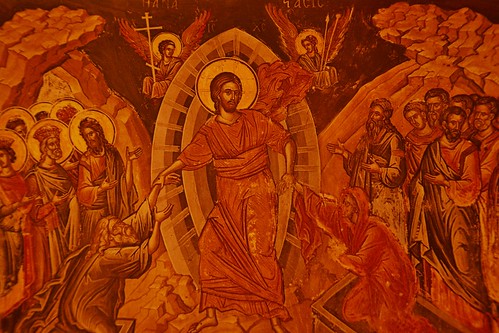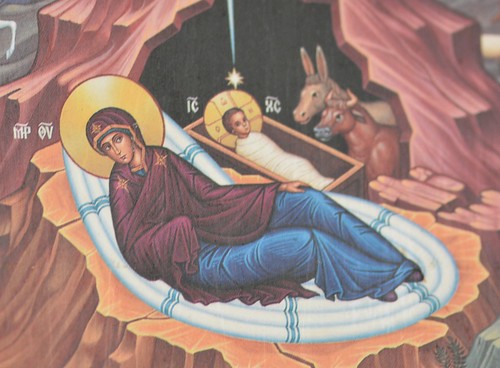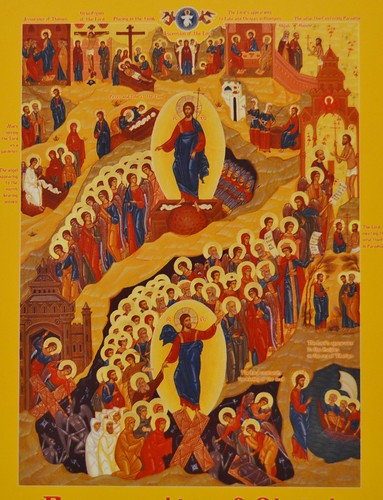The Gospel lesson of John 9:1-38 which gives us a narrative of Jesus healing a man blind from birth. It is one of the Post-Pascha Sunday Gospel themes and so continues exploring in the Orthodox liturgical context the Resurrection of Christ. The blind man is told by Christ to wash in the pool of water–a baptismal theme important for the continued spiritual development of those new Christians who had just been baptized at Pascha.

In the Orthodox Church on this Post-Paschal Sunday we read John 9:1-38. It is worth considering the verses right before and after that pericope as they help set the context of the Gospel lesson and give it additional meaning. The scripture just before the blind man pericope, John 8:56-59, takes place in the Temple precinct and has Jesus saying to the Jews:
Your father Abraham rejoiced that he was to see my day; he saw it and was glad.” The Jews then said to him, “You are not yet fifty years old, and have you seen Abraham?” Jesus said to them, “Truly, truly, I say to you, before Abraham was, I am.” So they took up stones to throw at him; but Jesus hid himself, and went out of the temple.
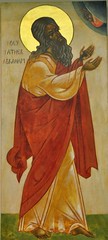 The text relates a debate which occurs between Jesus and His interlocutors regarding the interpretation of Scripture. Jesus maintains throughout His ministry that the Old Testament Scriptures are mostly a prophecy about Himself (see for example John 1:45, John 5:39-47, Luke 24:25-49). Jesus says Abraham spiritually saw ‘Christ’s’ day – He is making the claim that the way to read Torah is as a prophecy of Christ, but those debating with Him see the Torah more as Law or the Teaching about how to live rather than as prophecy referentially pointing to something or someone else. Those arguing with Jesus not only disagree with Jesus about how to understand the Torah but they don’t at all understand Jesus. They hear Jesus say ‘Abraham saw my day‘, but then twist His words around and incredulously challenge him as they know He is lying if He claims He has seen Abraham. But Jesus is telling them the Torah is prophecy (that is how Abraham saw Jesus), and Abraham was a prophet looking for the Messiah. This is not something all Jews believed. So they are rejecting Jesus’ interpretation of Torah and denying that the Torah is what Jesus says it is – prophecy of the coming Messiah. Jesus tries to show them what Torah is about but they refuse to see.
The text relates a debate which occurs between Jesus and His interlocutors regarding the interpretation of Scripture. Jesus maintains throughout His ministry that the Old Testament Scriptures are mostly a prophecy about Himself (see for example John 1:45, John 5:39-47, Luke 24:25-49). Jesus says Abraham spiritually saw ‘Christ’s’ day – He is making the claim that the way to read Torah is as a prophecy of Christ, but those debating with Him see the Torah more as Law or the Teaching about how to live rather than as prophecy referentially pointing to something or someone else. Those arguing with Jesus not only disagree with Jesus about how to understand the Torah but they don’t at all understand Jesus. They hear Jesus say ‘Abraham saw my day‘, but then twist His words around and incredulously challenge him as they know He is lying if He claims He has seen Abraham. But Jesus is telling them the Torah is prophecy (that is how Abraham saw Jesus), and Abraham was a prophet looking for the Messiah. This is not something all Jews believed. So they are rejecting Jesus’ interpretation of Torah and denying that the Torah is what Jesus says it is – prophecy of the coming Messiah. Jesus tries to show them what Torah is about but they refuse to see.
The narrative of the man born blind is preceded by a question about what is Torah? and Who can interpret it? The Jews are arguing the Torah tells them how to live, Jesus says Torah helps them see and He claims to be the light of the world. In other words, Torah reveals Him and He reveals the meaning of Torah.
After this discussion, Jesus leaves the temple: The temple was a sign of God’s presence in Israel — the Temple itself was a place for the people to encounter God, to encounter God’s message, to hear God’s prophecy, God’s word and to know what God is doing. But in the temple the people have just shown they can’t see God there and aren’t interested in what God is doing and are not willing to hear what God’s message is. Thus, they want to stone Jesus. Torah offered them an encounter with the living God, but they turned it into words carved into stone (so too their minds and hearts turned to stone! See 2 Corinthians 3).

In this Gospel lesson it is outside the temple that Christ gives sight to the blind man. It is outside the temple that the blind man’s eyes are recreated. Outside the temple Jesus proclaims Himself to be the light to the world. Those in the temple are still in darkness as is shown above in the conversation they have with Jesus. In the temple they remain spiritually blind. The Great Temple in Jerusalem with all its correct liturgical ritual fulfilling Torah and claims of being the place where God dwells on earth did not give sight to the blind, nor to the spiritual leaders of the Jews. Without Christ, even with the Temple and even within the Temple, there is spiritual blindness – the people cannot see what God is doing. So Jesus says: “For judgment I came into this world, that those who do not see may see, and that those who see may become blind.” Those in the temple are judged, it is outside the temple that people are enabled to see what God is doing, in fact to see God.
Jesus claims to be the light of the world. It is in Jesus and through Jesus that we see what God is doing. When we see the Torah as prophecy we see what God is doing, we see Christ. The Temple itself turns out to be no help to us in knowing God.
John 9:1-38
As he passed by, he saw a man blind from his birth. And his disciples asked him, “Rabbi, who sinned, this man or his parents, that he was born blind?” Jesus answered, “It was not that this man sinned, or his parents, but that the works of God might be made manifest in him. We must work the works of him who sent me, while it is day; night comes, when no one can work. As long as I am in the world, I am the light of the world.” As he said this, he spat on the ground and made clay of the spittle and anointed the man’s eyes with the clay, saying to him, “Go, wash in the pool of Siloam” (which means Sent). So he went and washed and came back seeing.
[“Wash in pool of Siloam” – these words from the Gospel are being used liturgically in Orthodoxy as being a reference to baptism. Baptism is not just for forgiveness of sins, but also for the healing of soul and body, it gives spiritual enlightenment, displays God’s work in our life, renews and regenerates godliness in us. As we pray in the Baptism service: “But show this water, O Master of all, to be the water of redemption, the water of sanctification, the purification of flesh and spirit, the loosing of bonds, the remission of sins, the illumination of the soul, the washing of regeneration, the renewal of the Spirit, the gift of adoption to sonship, the garment of incorruption, the fountain of life.”
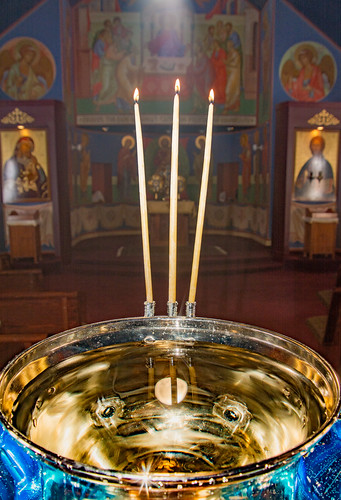
The neighbors and those who had seen him before as a beggar, said, “Is not this the man who used to sit and beg?” Some said, “It is he”; others said, “No, but he is like him.” He said, “I am the man.” They said to him, “Then how were your eyes opened?” He answered, “The man called Jesus made clay and anointed my eyes and said to me, ‘Go to Siloam and wash’; so I went and washed and received my sight.” They said to him, “Where is he?” He said, “I do not know.”
They brought to the Pharisees the man who had formerly been blind. Now it was a sabbath day when Jesus made the clay and opened his eyes. The Pharisees again asked him how he had received his sight. And he said to them, “He put clay on my eyes, and I washed, and I see.” Some of the Pharisees said, “This man is not from God, for he does not keep the sabbath.” But others said, “How can a man who is a sinner do such signs?” There was a division among them. So they again said to the blind man, “What do you say about him, since he has opened your eyes?” He said, “He is a prophet.” The Jews did not believe that he had been blind and had received his sight, until they called the parents of the man who had received his sight, and asked them, “Is this your son, who you say was born blind? How then does he now see?” His parents answered, “We know that this is our son, and that he was born blind; but how he now sees we do not know, nor do we know who opened his eyes. Ask him; he is of age, he will speak for himself.” His parents said this because they feared the Jews, for the Jews had already agreed that if any one should confess him to be Christ, he was to be put out of the synagogue. Therefore his parents said, “He is of age, ask him.” So for the second time they called the man who had been blind, and said to him, “Give God the praise; we know that this man is a sinner.”

He answered, “Whether he is a sinner, I do not know; one thing I know, that though I was blind, now I see.” They said to him, “What did he do to you? How did he open your eyes?” He answered them, “I have told you already, and you would not listen. Why do you want to hear it again? Do you too want to become his disciples?” And they reviled him, saying, “You are his disciple, but we are disciples of Moses. We know that God has spoken to Moses, but as for this man, we do not know where he comes from.” The man answered, “Why, this is a marvel! You do not know where he comes from, and yet he opened my eyes.
What becomes obvious in the Gospel lesson is that seeing is is not done only with the eyes. Seeing can also mean understanding; one sees spiritually as well. The healed blind man “sees” not only who Jesus is but also sees that the trouble with Jewish leadership is not that they can’t see with their eyes – they see clearly but don’t like what they see and so choose to blind themselves. They can see Jesus and what Jesus is doing, but they refuse to accept what they see. This leads them to put an evil interpretation on what is right in front of their eyes. They are willing to blind themselves to the truth because they don’t want to admit Jesus is God’s revelation, and that the Torah bears witness to Christ who is the light of the world. They don’t want what Jesus teaches to be true.
We know that God does not listen to sinners, but if any one is a worshiper of God and does his will, God listens to him. Never since the world began has it been heard that any one opened the eyes of a man born blind. If this man were not from God, he could do nothing.” They answered him, “You were born in utter sin, and would you teach us?” And they cast him out.
Jesus heard that they had cast him out, and having found him he said, “Do you believe in the Son of man?” He answered, “And who is he, sir, that I may believe in him?” Jesus said to him, “You have seen him, and it is he who speaks to you.” He said, “Lord, I believe”; and he worshiped him.
 The blind man did not see Jesus first when his eyes were opened. Rather his eyes were given sight and only later did this man physically see Jesus. In fact when he sees Jesus with his eyes, he does not recognize Jesus! But even before he ever saw Jesus physically, the man born blind clearly could see who Jesus is –the Messiah! When at the end of the Gospel lesson, Jesus is standing right in front of the cured blind man he does not know he is talking to Jesus. He came to faith, came to see and recognize Jesus as Messiah with the eyes of his heart, with faith, before he ever laid eyes on Jesus. He sees the Messiah before he sees the man Jesus. That is the same way that any of us can see Jesus today. The blind man is showing the way for all of us. Even if we can’t physically see Jesus today we are like the man born blind and so can know who Jesus is and we can have him in our lives. The Gospel is giving us encouragement – though we can’t see Jesus today, we know who He is and we know He is doing God’s will. We know He is our salvation, our path to God, our union with God. We each are born blind, we don’t see Jesus, but we learn about Him, and even when we can’t see Him with our eyes we come to know Him and we come to see He is God’s Son and our Messiah in and through the saints and the Church. As it turns out this person’s story is the story of each Christian. This Gospel lesson is about you and you are in the Gospel. The Gospel lesson tells us that physically seeing Jesus is of no advantage to a person – see also the account of the disciples who walk with the resurrected Jesus and don’t recognize Him in Luke 24. Those living in the First Century have no advantage over us living in the 21st Century. God is not visible to our eyes, but to our heart. What we need to see is not the physical traits of Jesus but rather we need to see the Messiah, the incarnate God. This is what an icon of Christ also reveals to us – not just a human, but the Messiah and Lord.
The blind man did not see Jesus first when his eyes were opened. Rather his eyes were given sight and only later did this man physically see Jesus. In fact when he sees Jesus with his eyes, he does not recognize Jesus! But even before he ever saw Jesus physically, the man born blind clearly could see who Jesus is –the Messiah! When at the end of the Gospel lesson, Jesus is standing right in front of the cured blind man he does not know he is talking to Jesus. He came to faith, came to see and recognize Jesus as Messiah with the eyes of his heart, with faith, before he ever laid eyes on Jesus. He sees the Messiah before he sees the man Jesus. That is the same way that any of us can see Jesus today. The blind man is showing the way for all of us. Even if we can’t physically see Jesus today we are like the man born blind and so can know who Jesus is and we can have him in our lives. The Gospel is giving us encouragement – though we can’t see Jesus today, we know who He is and we know He is doing God’s will. We know He is our salvation, our path to God, our union with God. We each are born blind, we don’t see Jesus, but we learn about Him, and even when we can’t see Him with our eyes we come to know Him and we come to see He is God’s Son and our Messiah in and through the saints and the Church. As it turns out this person’s story is the story of each Christian. This Gospel lesson is about you and you are in the Gospel. The Gospel lesson tells us that physically seeing Jesus is of no advantage to a person – see also the account of the disciples who walk with the resurrected Jesus and don’t recognize Him in Luke 24. Those living in the First Century have no advantage over us living in the 21st Century. God is not visible to our eyes, but to our heart. What we need to see is not the physical traits of Jesus but rather we need to see the Messiah, the incarnate God. This is what an icon of Christ also reveals to us – not just a human, but the Messiah and Lord.
John 9:39-41
Jesus said, “For judgment I came into this world, that those who do not see may see, and that those who see may become blind.” Some of the Pharisees near him heard this, and they said to him, “Are we also blind?” Jesus said to them, “If you were blind, you would have no guilt; but now that you say, ‘We see,’ your guilt remains.
If we don’t see our Lord, it is because we choose not to. We can’t just use our eyes for this, we have to use our heart, our faith, our love. If we think Jesus is nothing but a nice man or a miracle worker, then we aren’t seeing Christ.

Two additional notes:
1] Jesus says the man was born blind so that the works of God might be made manifest in him — we so often see our limits or handicaps as deficits which depress us that we aren’t like others. But in this Gospel, we see that whatever we don’t like about ourselves might also be used to display God’s power in us, it can even serve to protect us from committing the sins that everyone else does. God might help any one of us overcome our limits and shortcomings in order to display His power to others through us. Don’t put yourself down or feel sorry for yourself because you are not like others or feel you are somehow aren’t as good as others. God may be protecting you from making the mistakes and sins others do, or God may use your “weakness to accomplish” His will. As St. Paul said of himself:
And to keep me from being too elated by the abundance of revelations, a thorn was given me in the flesh, a messenger of Satan, to harass me, to keep me from being too elated. Three times I besought the Lord about this, that it should leave me; but he said to me, “My grace is sufficient for you, for my power is made perfect in weakness.” I will all the more gladly boast of my weaknesses, that the power of Christ may rest upon me. For the sake of Christ, then, I am content with weaknesses, insults, hardships, persecutions, and calamities; for when I am weak, then I am strong. [ 2 Corinthians 12:7-10)
2] “Why me?” that’s the common questions we ask when something goes wrong in our lives. The disciples ask Jesus about the man born blind – Why him? What did he do or what did his parents do?
 We act as if we believe in magic – do good and nothing bad can happen to you. Jesus refutes this attitude and acknowledges there is a spiritual warfare raging in the world. Jesus answered, “It was not that this man sinned, or his parents, but that the works of God might be made manifest in him. We must work the works of him who sent me, while it is day; night comes, when no one can work. As long as I am in the world, I am the light of the world.” Jesus says there is a war going on between light and darkness, and He is here to bring light to the world. The blind man’s condition is not the consequence of some petty sin but rather is part of the cosmic battle in which evil wants to destroy life. We are able to see heaven opened and to see how Light overcomes darkness. We are able to receive the Light that is not overcome by the night and to enter that Light.
We act as if we believe in magic – do good and nothing bad can happen to you. Jesus refutes this attitude and acknowledges there is a spiritual warfare raging in the world. Jesus answered, “It was not that this man sinned, or his parents, but that the works of God might be made manifest in him. We must work the works of him who sent me, while it is day; night comes, when no one can work. As long as I am in the world, I am the light of the world.” Jesus says there is a war going on between light and darkness, and He is here to bring light to the world. The blind man’s condition is not the consequence of some petty sin but rather is part of the cosmic battle in which evil wants to destroy life. We are able to see heaven opened and to see how Light overcomes darkness. We are able to receive the Light that is not overcome by the night and to enter that Light.
 “Emperor Julian the Apostate (c. 331-363) once complained that Christians had ‘filled the whole world with tombs and sepulchers,’ and by their processions with and in honor of the departed they were ‘straining the eyes of all with ill-omened sights of the dead.’ Early Christians, by contrast, held that the death of believers was a cause of hope, and their bodies, far from being ill-omened, were precious links to the faith Christians had in the Resurrection of the Dead. The Apostle Paul describes this in 1 Thess 4:16-17 as a joyous day when a loud call will sound and the Lord will come again, “and the dead in Christ will rise first. Then we who are alive, who are left, will be caught up together with them in the clouds to meet the Lord in the air; and so we will be with the Lord for ever.” Christ himself says in Jn 5:28-29 that that ‘the day is coming when all who are in their graves will hear his [the Son of Man’s] voice and will come out . . .” These are the two readings used in the Orthodox Order for the Burial of the Dead, and they set a resurrectional tone for the whole liturgy.
“Emperor Julian the Apostate (c. 331-363) once complained that Christians had ‘filled the whole world with tombs and sepulchers,’ and by their processions with and in honor of the departed they were ‘straining the eyes of all with ill-omened sights of the dead.’ Early Christians, by contrast, held that the death of believers was a cause of hope, and their bodies, far from being ill-omened, were precious links to the faith Christians had in the Resurrection of the Dead. The Apostle Paul describes this in 1 Thess 4:16-17 as a joyous day when a loud call will sound and the Lord will come again, “and the dead in Christ will rise first. Then we who are alive, who are left, will be caught up together with them in the clouds to meet the Lord in the air; and so we will be with the Lord for ever.” Christ himself says in Jn 5:28-29 that that ‘the day is coming when all who are in their graves will hear his [the Son of Man’s] voice and will come out . . .” These are the two readings used in the Orthodox Order for the Burial of the Dead, and they set a resurrectional tone for the whole liturgy.











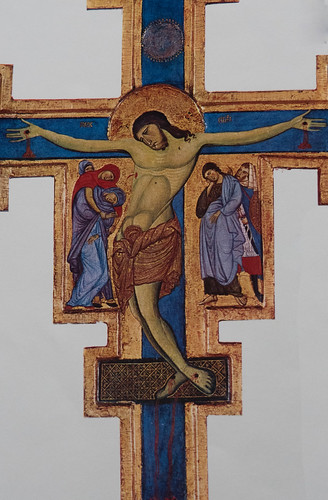

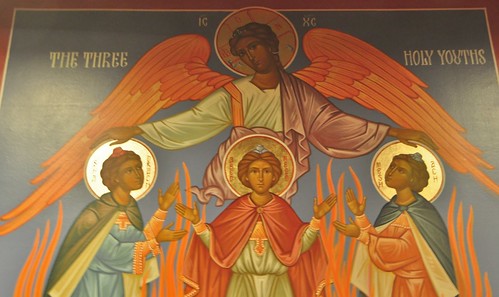




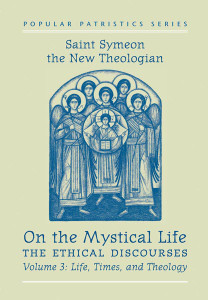 “These… eternal good things…
“These… eternal good things… 